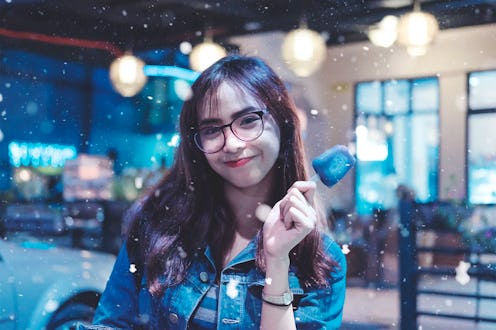
Thriving as a feminist artist — or any kind of artist — in the U.S. is far from easy. On top of a lack of affordable healthcare (which is being dismantled by the Trump administration as we speak) and programs to cultivate and fund creative works (which is also being dismantled by the Trump administration as we speak), there is still a pervasive cultural view that art is frivolous and unnecessary.
As Danielle Thys wrote in a powerful piece in Medium following the horrific Ghost Ship Artist Collective Warehouse fire, "We live in a schizoid society that denigrates process and deifies product." She noted how in Germany, $20 from every taxpayer goes to arts funding, while in the U.S., that amount is a paltry $0.43. And that's not even broaching the subject of how expensive art schools are, and how difficult it is to pay off student loans as a working artist once you graduate. Add all this to the challenge of making art as a woman, person of color, or queer person, and you have a recipe for tough times ahead.
However bad it may sound, though, the situation is not hopeless — in fact, art is arguably more important now than ever. At a Watch Us Run panel on Inauguration Day put on by The Huffington Post and Bustle, five feminist artists gathered together to discuss what it means to be a creative person in the age of Trump — and how to survive. These are a few of their uplifting ideas:
1Your Voice Matters Now More Than Ever
Orange Is The New Black actress Jackie Cruz affirmed how important it is for artists to be politically involved. She was particularly inspired to speak out after her cast mate Diane Guerrero used her platform to advocate for immigrant rights.
"I saw how powerful her story was, and I was like, wow, we need to use our voice now more than ever," Cruz said. "I just want to talk about what I believe in: the environment, women's rights, immigration reform, prison reform. Our president now was a celebrity, why is his opinion more important than mine?"
2Art Can Change How Society Views Women
Phoebe Robinson of 2 Dope Queens explained how curating a comedy show that centers people "who aren't straight white dudes" allows for the dissemination of viewpoints too often ignored by mainstream media. Instead of marginalized identities being the butt of the joke — as they often are in popular culture — they are supported and respected on her show.
"We come from a personal place, so the personal is automatically political to us," Robinson said. For example, talking about black hair and going to Billy Joel concerts helps breaks down stereotypes about women of color, she told the crowd. The audience laughed, but her point was received. Creating art that can help humanize and diversify our understandings of those different from us is revolutionary work.
3Revolutionary Art Is More Than Reactive
Conceptual artist and creator of the Cliteracy project Sophia Wallace made a powerful statement about how artists can drive the conversation instead of merely reacting to oppressive narratives. She raised the example of the SlutWalk and the Nasty Women art show, both named in response to men denigrating women with derogatory language.
"Why do we have to spend all of our time reacting?" Wallace asked. "Let’s make new language. And let's ask questions back." She suggested that instead of asking, "Is she a slut," the question really should be "Are you ill-cliterate?” Feminist artists in particular need to shape their own narratives instead of merely responding to hegemonic rhetoric, she urged. "We are so creative, we have so much to offer," Wallace concluded. "Let’s listen to our own ideas and take them seriously."
4Art Can Break Through The Political Divide
Actor Erin Darke of Good Girls Revolt addressed the ideological divide in America, and how art can influence and even transcend politics. "I very firmly believe that part of the reason nationwide acceptance of marriage equality increased was because of shows like Will & Grace and Modern Family," she said.
Art, more than anything else, Darke emphasized, can give so-called "Others" the humanity they deserve, and tell their stories in ways that can impact the politics and perspectives of people in both red and blue states.